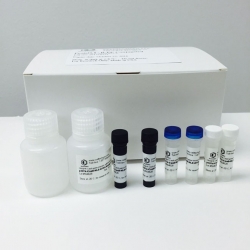Caspase-3 Fluorometric Assay Kit
Caspase-3 Fluorometric Assay Kit
Cat. #: CB003
Size: 100 Tests
Kit components:
DEVD-AFC Substrate: 500 μL of 1 mM DEVD-AFC (protect from light).
DTT: 400 μL of a 1 M solution of dithiothreitol (DTT).
Lysis Buffer: 100 mL of Lysis Buffer. May be stored for up to 6 months at 2-8 °C.
2X Reaction Buffer: 4 vials (2.0 mL/vial) of 2X Reaction Buffer 3.
Description
Caspases are a family of cytosolic aspartate-specific cysteine proteases involved in the initiation and execution of apoptosis. Human caspases can be subdivided into three functional groups: cytokine activation (caspase-1, -4, -5, and -13), apoptosis initiation (caspase-2, -8, -9, -and -10), and apoptosis execution (caspase-3, -6, and -7). Caspase-3, also known as CPP-32, Yama or Apopain, is an intracellular cysteine protease that exists as a proenzyme, becoming activated during the cascade of events associated with apoptosis. Caspase-3 cleaves a variety of cellular
molecules that contain the amino acid motif DEVD such as poly ADP ribose polymerase (PARP), the 70 kD protein of the U1-ribonucleoprotein and a subunit of the DNA dependent protein kinase. The presence of Caspase-3 in cells of different lineages suggests that Caspase-3 is a key enzyme required for the execution of apoptosis.
The Caspase 3 Fluorometric Assay Kit is based on the hydrolysis of DEVD-AFC by caspase 3, resulting in the release of the fluorescent 7-amino-4-trifluoromethyl coumarin (AFC). The concentration of the AFC released can be calculated from a calibration curve prepared with AFC standards (AFC standard included with the kit).
Applications: The Caspase 3 Fluorimetric Assay Kit is designed for the detection and measurement of caspase 3 activity in cell extracts or purified preparations of caspase 3. Cells that are suspected or have been induced to undergo apoptosis are first lysed to collect their intracellular contents. The cell lysate can then be tested for protease activity by the addition of a caspase-specific peptide that is conjugated to the fluorescent reporter molecule 7-amino-4-trifluoromethyl coumarin (AFC). The cleavage of the peptide by the caspase releases the fluorochrome that, when excited by light at 400 nm wavelength, emits fluorescence at 505 nm. The level of caspase enzymatic activity in the cell lysate is directly proportional to the fluorescence signal detected with a fluorimeter or a fluorescent microplate reader.
Procedure
1. Cells are harvested and lysed by the addition of the Lysis Buffer. The amount of Lysis Buffer to be added to the pellet is determined by the number of cells. Add 25 μL of cold Lysis Buffer per 1 x 106 cells.
2. The cell lysate is incubated on ice for 10 minutes and then centrifuged at 10,000 x g for 1 minute. Collect the supernate to a new tube and keep on ice. The total protein concentration should be at 2-4 mg/mL.
3. Add 50 μL of cell lysate to each well of microplate.
4. Add 50 μL of 2X Reaction Buffer to each well. Prior to using the 2X Reaction Buffer, add 10 μL of fresh DTT stock per 1 mL of 2X Reaction Buffer.
5. Add 5 μL of Caspase-3 fluorogenic substrate (DEVD-AFC) to each reaction well.
6. Incubate the plate at 37 °C for 1-2 hours.
7. Read the plate on a fluorescent microplate reader using an excitation laser at 400 nm and emitted light at 505 nm.
8. Additional controls that should be included in this assay are a) no cell lysate and b) no substrate. A recombinant Caspase-3 enzyme is available for use as a positive control or standard..
Storage: Store at ≤ -20 °C for up to 6 months after initial use. Avoid repeated freeze-thaw cycles.
| Related Products | ||
| Cat. # | Name | |







 Categories
Categories Shopping Cart
Shopping Cart Information
Information
